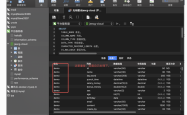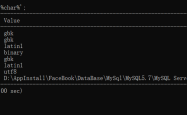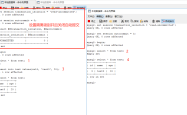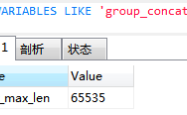Mysql sql慢查询监控脚本代码实例
1、修改my.cnf
sql" id="highlighter_114855"> ?| 1 2 3 4 5 6 7 8 9 10 11 12 13 | #整体的效果,全局开启表和日志文件都写,但是对于general_log只写表,对于slow_query_log,表和日志文件都记录。 general_log=1#开启mysql执行sql的日志 slow_query_log=1#开启mysql慢sql的日志 #设置之后会影响general_log和slow_query_log, log_output= table ,File#日志输出会写表,也会写日志文件,为了便于程序去统计,所以最好写表 #这里没配置general_log_file,那么general_log就只会写表了 #在mysql5.1.29以上,设置以下即可打开mysql将执行的sql记录在文件中 #general_log_file=/log/general.log #5.1.29以以前为: #log=/var/lib/mysql/sql_row.log long_query_time=1#设置mysql的慢查询为超过1s的查询 slow_query_log_file=/log/slow.log |
2、修改mysql的日志表(在mysql库中)的格式
#默认general_log是csv的格式,修改为MyISAM格式查询效率会高很多
set global general_log = off;
alter table general_log engine = MyISAM;
set global general_log = on;
#默认slow_query_log是csv的格式,修改为MyISAM格式查询效率会高很多
set global slow_query_log = off;等于0效果一样
alter table slow_log engine = MyISAM;
set global slow_query_log = on;等于1效果一样
3、因为mysql的日志表:general_log和slow_query_log不允许修改,所以需要新建出一个便于删除修改的表(这个日志表太大,需要定期清理n天前得数据)
建立slow_log_dba的表
?| 1 2 3 4 5 6 7 8 9 10 11 12 13 | CREATE TABLE `slow_log_dba` ( `start_time` timestamp NOT NULL DEFAULT CURRENT_TIMESTAMP ON UPDATE CURRENT_TIMESTAMP , `user_host` mediumtext NOT NULL , `query_time` time NOT NULL , `lock_time` time NOT NULL , `rows_sent` int (11) NOT NULL , `rows_examined` int (11) NOT NULL , `db` varchar (512) NOT NULL , `last_insert_id` int (11) NOT NULL , `insert_id` int (11) NOT NULL , `server_id` int (10) unsigned NOT NULL , `sql_text` mediumtext NOT NULL ) ENGINE=MyISAM DEFAULT CHARSET=utf8 COMMENT= 'Slow log for dba' ; |
建立general_log_dba的表
?| 1 2 3 4 5 6 7 8 9 10 | CREATE TABLE `general_log_dba` ( `event_time` timestamp NOT NULL DEFAULT CURRENT_TIMESTAMP ON UPDATE CURRENT_TIMESTAMP , `user_host` mediumtext NOT NULL , `thread_id` int (11) NOT NULL , `server_id` int (10) unsigned NOT NULL , `command_type` varchar (64) NOT NULL , `argument` mediumtext NOT NULL , KEY `user_host` (`user_host`(200)), KEY `event_time` (`event_time`) ) ENGINE=MyISAM DEFAULT CHARSET=utf8 COMMENT= 'general log for dba op' ; |
4、因为程序最终使用的general_log_dba和slow_log_dba的表,所以需要定时的将general_log和slow_query_log的数据拷贝到general_log_dba和slow_log_dba之中
因为报告是每天生成一次,所以这个动作只要每天操作一次即可
#脚本是保存10天得数据,每天将general_log和slow_query_log的数据拷贝到general_log_dba和slow_log_dba之中
#做定时任务每天执行一次 mysqllogtable.sh
#!/bin/sh
NDaysAgo=$(date -d '-10 days' "+%F %H:%M:%S")
/usr/local/mysql/bin/mysql -uXXXX -p'xxxxxxxx' -D'mysql' -e "insert general_log_dba select * from general_log;
truncate general_log;
delete from general_log_dba where event_time < \"$NDaysAgo\";
insert slow_log_dba select * from slow_log;
truncate slow_log;
delete from slow_log_dba where start_time < \"$NDaysAgo\""
5、python脚本写统计每天sql操作和每天的mysql的慢查询(脚本中有部分是可以抽象的方法,请自己酌情处理)
统计mysql每日执行记录的脚本
?| 1 2 3 4 5 6 7 8 9 10 11 12 13 14 15 16 17 18 19 20 21 22 23 24 25 26 27 28 29 30 31 32 33 34 35 36 37 38 39 40 41 42 43 44 45 46 47 48 49 50 51 52 53 54 55 56 57 58 59 60 61 62 63 64 65 66 67 68 69 70 71 72 73 74 75 76 77 78 79 80 81 82 83 84 85 86 87 88 89 90 91 92 93 94 95 96 97 98 99 100 101 | # -*- coding: utf-8 -*- __author__ = 'river' import MySQLdb as mysql import re from datetime import datetime, timedelta import smtplib from email.mime.text import MIMEText def sendHtmlMail(mailcontent,myip): try : yestoday = (datetime.now() - timedelta(days = 1 )).strftime( "%Y-%m-%d" ) sender = 'xxx@xxx.com' receiver = [ 'xxx@xxx.com' ] subject = myip + ' mysql operation report ' + yestoday smtpserver = 'smtp.exmail.xx.com' username = 'xxx@xxx.com' password = 'xxxxx' msg = MIMEText(mailcontent, 'html' , 'utf-8' ) #'你好','text','utf-8' msg[ 'Subject' ] = subject msg[ 'From' ] = sender msg[ 'To' ] = 'xxx@xxxxxxxx.com' smtp = smtplib.SMTP() smtp.connect(smtpserver) smtp.login(username, password) smtp.sendmail(sender, receiver, msg.as_string()) smtp.quit() except Exception, e: print e, 'send mail error' if __name__ = = '__main__' : result = None htmlfile = 'mysqlLogMon.html' myiplist = [ '192.168.10.10' , '192.168.10.19' ] yestoday = (datetime.now() - timedelta(days = 1 )).strftime( "%Y-%m-%d 00:00:00" ) today = datetime.now().strftime( "%Y-%m-%d 00:00:00" ) for myip in myiplist: sql = "select user_host,argument from general_log_dba where event_time >='%s' and event_time <='%s'" % (yestoday,today) try : dbcon = mysql.connect(host = myip, user = 'xxxxx' , passwd = 'xxxxx' , db = 'mysql' , port = 3306 ,charset = 'utf8' ) cur = dbcon.cursor() print "step 1," + myip + ',' + datetime.now().strftime( "%Y-%m-%d %H:%M:%S" ) cur.execute(sql) result = cur.fetchall() cur.close() dbcon.close() except Exception, e: print e, 'conn mysql error' user_host_set = set () print "step 2," + myip + ',' + datetime.now().strftime( "%Y-%m-%d %H:%M:%S" ) allhash = {} if result: for user_host,argument in result: argument_delcom = re. compile (r '(\/\*(\s|.)*?\*\/)' ).sub(" ",argument).strip().replace(u" \x00",'').lower() if re. compile (r '^access.*' ).match(argument_delcom) or re. compile (r '^.*@.*on.*' ).match(argument_delcom) or re. compile (r '^grant.*' ).match(argument_delcom): tmpargument = argument_delcom.strip() else : tmpargument = argument_delcom.split( ' ' )[ 0 ].strip() if len (tmpargument)> 30 : #有些sql是u'select\n\t\t\t\t\tcount(m.enquirymainid)',可以使用print repr(tmpargument) tmpargument = argument_delcom.split( '\n' )[ 0 ].strip() #如果全是注释,那么就不统计这条目了 if not tmpargument or tmpargument.strip() = = ' ' or tmpargument.strip()==' ': continue if allhash.has_key(user_host): allhash[user_host][tmpargument] = allhash[user_host].get(tmpargument, 0 ) + 1 else : allhash[user_host] = {tmpargument: 1 } print "step 3," + myip + ',' + datetime.now().strftime( "%Y-%m-%d %H:%M:%S" ) headhtml = ''' ''' print "step 4," + myip + ',' + datetime.now().strftime( "%Y-%m-%d %H:%M:%S" ) with open (htmlfile, 'w' ) as htmlfileobj: htmlfileobj.write(headhtml) htmlfileobj.flush() print "step 5," + myip + ',' + datetime.now().strftime( "%Y-%m-%d %H:%M:%S" ) with open (htmlfile, 'a' ) as htmlfileobj: for hostkey in allhash.keys(): listtmp = sorted (allhash[hostkey].iteritems(),key = lambda labkey:labkey[ 1 ],reverse = True ) rowspan = len (allhash[hostkey]) #htmlfileobj.write() tmpline = ' ' %(rowspan,hostkey.encode(' utf - 8 ')) htmlfileobj.write(tmpline) countn = 0 for runsql,count in listtmp: if countn = = 0 : tmpline = ' ' %(runsql.encode(' utf - 8 '),count) else : tmpline = ' ' %(runsql.encode(' utf - 8 '),count) countn + = 1 htmlfileobj.write(tmpline) tmpline = ''' 用户 执行sql 执行次数 %s %s %s %s %s ''' htmlfileobj.write(tmpline) with open (htmlfile, 'r' ) as htmlfileobj: mailcontent = htmlfileobj.read() sendHtmlMail(mailcontent,myip) else : print 'sql result is None,exit ing' print "step 6," + myip + ',' + datetime.now().strftime( "%Y-%m-%d %H:%M:%S" ) |
以上就是本文的全部内容,希望对大家的学习有所帮助,也希望大家多多支持服务器之家。
原文链接:https://www.cnblogs.com/-wenli/p/13782341.html
1.本站遵循行业规范,任何转载的稿件都会明确标注作者和来源;2.本站的原创文章,请转载时务必注明文章作者和来源,不尊重原创的行为我们将追究责任;3.作者投稿可能会经我们编辑修改或补充。










